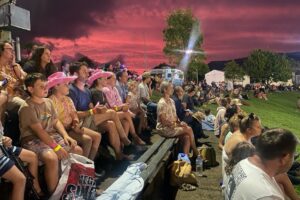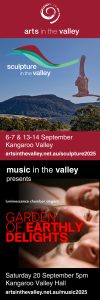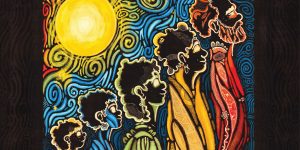On 1 June at Kangaroo Valley Hall, Music in the Valley presented ‘Tea for Two’ – songs and duets from The Golden Age of Hollywood – with soprano Lorina Gore and tenor Andrew Goodwin, accompanied by pianist Anthony Smith.
The Golden Age of song, typically spanning from the 1920s to the 1950s, was a rich and transformative period in American music, particularly defined by the rise of Tin Pan Alley, Broadway, Hollywood musicals and the Great American Songbook.
The political turmoil and two world wars had instigated a flood of immigrants from Europe, especially Jewish, Italian and Eastern European people, who brought their own musical traditions that blended into American styles. Composers like Irving Berlin and George Gershwin integrated classical, folk and jazz elements into their songs. Jazz, blues and spirituals also had a profound impact, incorporating syncopation, swing rhythms and blues tonality, further influencing composers like Cole Porter.
The rise of musical films and Broadway provided platforms for songs to reach wide audiences and songs from these venues became standards – for example Rodgers and Hammerstein musicals. Songs were crafted to suit both narrative and emotional expression, deepening their cultural resonance.
In New York, a centralised industry was established in the locality of Tin Pan Alley where songwriters, publishers and performers collaborated to mass produce music for vaudeville, theatre and the home. Hit songs became a commodity. Gershwin’s first song ‘Swanee’ sung by Al Jolson (1919) earned the composer $10,000 in royalties in its first year, a fantastic sum in those days.
The 1920s saw the explosion in interest for radio, making music more accessible to a national audience and creating a demand for popular songs. This economic viability encouraged songwriters and crooners like Bring Crosby and Frank Sinatra, popularising songs beyond stage and print. Phonographs, radio and later television created new pathways for the discovery of music. Music became more than an art – it became an element of lifestyle and identity. Women like Dorothy Fields, Peggy Lee and Doris Day contributed as lyricists and performers expanding female roles in a male-dominated industry. In song, you saw the changing views on romance, freedom and individuality, matching the evolving American psyche.
The Golden Age of American Song emerged from a unique confluence of war, migration, innovation and industry. Politically influenced by national unity and federal arts programs, shaped culturally by a rich mix of traditions, driven economically by a growing entertainment industry and moulded socially by modern life and mass media, this era produced timeless standards that continue to define American musical identity.
Cool night, warm sounds
It was a chilly evening on 1 June, but Kangaroo Valley Hall was warmed by the honeyed sounds and heartfelt stylish renditions of Lorina and Andrew harmonising together. A comforting visit to a past long gone, this wonderful genre of music felt like a warm hug.
The honeyed voices of our own local world class opera star, Lorina Gore, all aglitter in her rose-gold spangled dress and curls, and Australian star tenor Andrew Goodwin, super suave in his tux – crooning and swooning together at last in this repertoire they are both so fond of but rarely get to sing – was a rare treat. The program was carefully chronologically researched and chattily introduced by Lorina, and her wistful rendition of ‘Somewhere Over The Rainbow’ had me in tears … looking around the room I noticed there were a few others dabbing their eyes.
The Program
1934 – ‘Love Unspoken’ (The Merry Widow)
1936 – ‘It Had To Be You’
1939 – ‘Somewhere Over The Rainbow’
1940 – ‘I’ll See You Again’
1944 – ‘Swinging on a Star’
1950 – ‘Tea For Two’
1951 – ‘Stardust’ (Another Man’s Poison)
1953 – ‘So In Love’ (Kiss Me Kate)
Interval
1954 – ‘We’ll Gather Lilacs In The Spring’
1954 – ‘Song Of India’
1955 – ‘People Will Say We’re In Love’ (Oklahoma)
1956 – ‘True Love’ (High Society)
1959 – ‘A Dream Is A Wish Your Heart Makes’
1961 – ‘One Hand One Heart (West Side Story)
1961 – ‘Tonight’ (West Side Story)
Encores
1967 – ‘Somethin’ Stupid’ (Frank and Nancy Sinatra)
1950 – ‘Brindisi’ (The Toast of New Orleans)
Program notes by Lorina Gore
Concert review by Bridget Crouch




